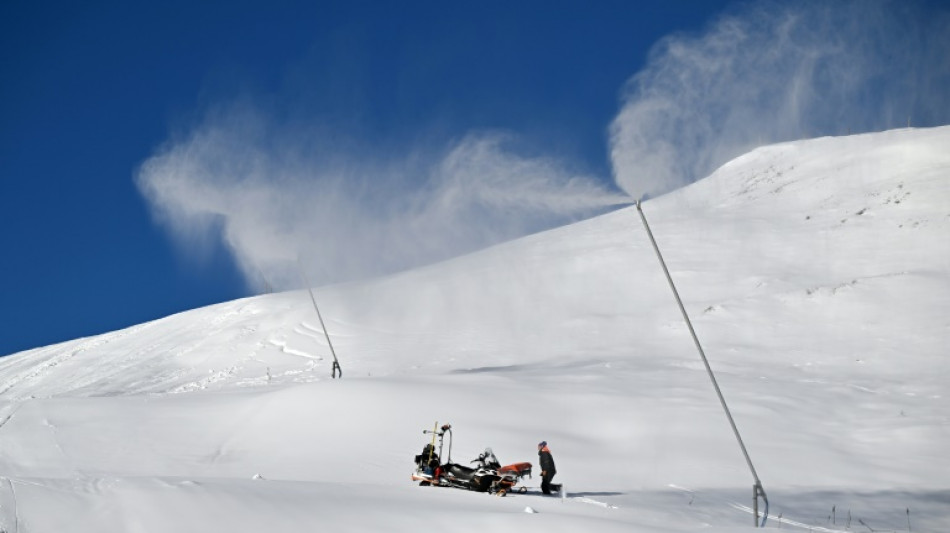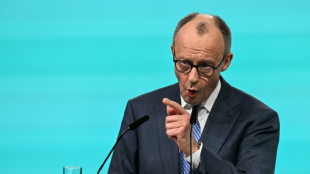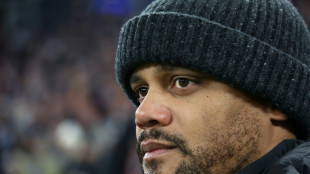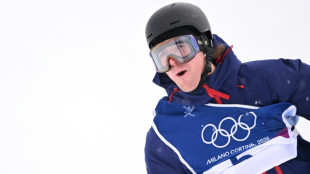
-
 Germany's Merz to visit China next week
Germany's Merz to visit China next week
-
Kompany says Mourinho made 'huge mistake' in Vinicius racism row

-
 X appeals EU's 120-mn-euro fine over digital content violations
X appeals EU's 120-mn-euro fine over digital content violations
-
Galthie recalls hulking locks Flament, Meafou for Italy

-
 Turkey, Saudi sign major solar power deal
Turkey, Saudi sign major solar power deal
-
US Olympic freeskier Hess embraces 'loser' tag after Trump blast

-
 European stocks rebound, oil prices ease after US-Iran volatility
European stocks rebound, oil prices ease after US-Iran volatility
-
'Alpha male' AI world shuts out women: computing prof Hall

-
 New Zealand freestyle skier Ives in hard Olympic crash
New Zealand freestyle skier Ives in hard Olympic crash
-
New Zealand must adapt quickly to Sri Lanka wickets: Chapman

-
 Thai activist's jail term for royal insult extended to 30 years
Thai activist's jail term for royal insult extended to 30 years
-
Families of Duterte's drug war victims eye Hague hearing with hope

-
 India chases 'DeepSeek moment' with homegrown AI
India chases 'DeepSeek moment' with homegrown AI
-
UN touts panel for 'human control' of AI at global summit

-
 Ukraine Paralympics team to boycott Opening Ceremony over Russian flag decision: statement
Ukraine Paralympics team to boycott Opening Ceremony over Russian flag decision: statement
-
UK monarchy reels from Andrew's stunning arrest

-
 Somaliland, where Muslims love Israel
Somaliland, where Muslims love Israel
-
Florida airport to be renamed after US President Donald Trump

-
 Fans flock to Japan zoo to see viral baby monkey Punch
Fans flock to Japan zoo to see viral baby monkey Punch
-
Stocks mixed, oil rises after Trump Iran threat

-
 Outspoken Laos lawmaker's election exit sparks rare dissent
Outspoken Laos lawmaker's election exit sparks rare dissent
-
Kim Jong Un vows to boost living standards as he opens rare congress

-
 Shepherd hat-trick to Samra ton: Five top T20 World Cup performances so far
Shepherd hat-trick to Samra ton: Five top T20 World Cup performances so far
-
Zimbabwe surprise as T20 World Cup Super Eights begin without Australia

-
 Victorious Takaichi promises 'strong and prosperous' Japan
Victorious Takaichi promises 'strong and prosperous' Japan
-
Ex-South Korea leader apologises for martial law crisis

-
 Ex-S. Korea leader apologises for martial law crisis
Ex-S. Korea leader apologises for martial law crisis
-
Messi kicks off MLS season in key World Cup year

-
 Teen burnout to Olympic gold: Alysa Liu 'looking to inspire others'
Teen burnout to Olympic gold: Alysa Liu 'looking to inspire others'
-
Cunningham stars as NBA-leading Pistons ease past Knicks

-
 Andre Gomes joins MLS side Columbus Crew
Andre Gomes joins MLS side Columbus Crew
-
Scottish inconsistency 'bugs everyone' says former international Beattie

-
 England turn to Pollock for Six Nations boost against Ireland
England turn to Pollock for Six Nations boost against Ireland
-
Arsenal aim to banish title jitters in Spurs showdown

-
 Scrutiny on Flick rises as Barca seek recovery
Scrutiny on Flick rises as Barca seek recovery
-
Leipzig host red-hot Dortmund with Champions League hopes slipping away

-
 Nvidia nears deal for scaled-down investment in OpenAI: report
Nvidia nears deal for scaled-down investment in OpenAI: report
-
Japan inflation eases in welcome news for PM Takaichi

-
 McIlroy shares Riviera clubhouse lead as Rai charges, Scheffler fades
McIlroy shares Riviera clubhouse lead as Rai charges, Scheffler fades
-
Philippines' Duterte earned global infamy, praise at home

-
 Stocks drop, oil rises after Trump Iran threat
Stocks drop, oil rises after Trump Iran threat
-
As European heads roll from Epstein links, US fallout muted

-
 Families of Duterte's drug war victims eye Hague hearing hopefully
Families of Duterte's drug war victims eye Hague hearing hopefully
-
Russian decision is a betrayal: Ukrainian Paralympics chief

-
 Venezuela parliament unanimously approves amnesty law
Venezuela parliament unanimously approves amnesty law
-
Martinez missing as Inter limp to Lecce after Bodo/Glimt humbling

-
 India chases 'DeepSeek moment' with homegrown AI models
India chases 'DeepSeek moment' with homegrown AI models
-
World leaders to declare shared stance on AI at India summit

-
 'Everything was removed': Gambians share pain with FGM ban in balance
'Everything was removed': Gambians share pain with FGM ban in balance
-
Kim Jong Un opens rare party congress in North Korea


Spiking costs, fading snow squeeze Austrian ski resorts
One of Austria's top ski resorts is making as much artificial snow as possible to lay a thick base on the slopes before its energy bills leap.
Like other spots across the Alps, world-famous Kitzbuehel is being hit by inflation-driven cost hikes, but also warmer winters that are ever less snowy.
"We expect that our power costs will at least double this season," said Anton Bodner, head of the resort's Bergbahn Kitzbuehel company, noting several lower price energy contracts run out by year's end.
"We are talking about millions of euros," he added, while looking over one of the few slopes already open.
The soaring energy bills for Austria's famed ski resorts have translated into pricier tickets, but also shorter hours and reduced service.
"We have no choice but to pass higher power prices on to our customers," Bodner told AFP, adding that they had kept increases below inflation, which stood at 11 percent by October.
Ski resorts like Kitzbuehel will try to save money by trimming opening times, ramping up snowmaking when temperatures are colder and reducing lift capacity to save energy.
Kitzbuehel plans to run its lifts about two hours less per day, opening slightly later and closing earlier.
- Less schnitzel –
But at the end of the day, it's skiers who wind up feeling the pinch and fewer are expected to turn up.
A recently conducted survey was pointing towards significantly fewer holidaymakers this winter season in Austria due to high inflation compared to 2019, said Oliver Fritz, senior economist at the Austrian Institute of Economic Research (WIFO).
"Even if a (winter) vacation is planned, potential guests want to spend less," Fritz said.
Cutting expenses like eating out, shortening holidays or turning to cheaper accommodation or resorts are some of the ways people are dialling back.
"At the restaurant we will only have schnitzel once a week and not twice" like we used to, skiier Klaus Bernert told AFP in Kitzbuehel, which is known for its alpine skiing downhill race.
"Everything has become about 20, 30 percent more expensive. Another 20, 30 percent, and we can no longer afford skiing. Then we would unfortunately have to give up our hobby," the 58-year-old added.
Equipment and season passes for him and another family member "already ate up two to three monthly salaries", he said.
Sabine Huber, a local from a nearby valley, said she expected more and more people to continue to switch to ski touring, a sport where enthusiasts climb the slopes on skis, rendering lift tickets unnecessary.
"I'm lucky that I'm a ski tourer and can practise my sport relatively cheaply. Of course, I know many who are already considering whether or not to buy a ski pass because of high prices," she said.
- Melting profits –
Austria's famous ski resorts are part of its winter tourism industry, which pulled in about 3.9 percent of the country's national GDP in 2019, before the pandemic slashed profits.
Ski resorts are trying to stay optimistic, but it remains to be seen how Alpine tourist destinations across Europe will fare as warming temperatures and inflation threaten their very existence.
"Since 1961, the average annual snow cover duration over the entire area of Austria has decreased by 40 days," said Marc Olefs, head of climate research at Austria's national meteorological and geophysical service ZAMG.
Without measures to cut greenhouse gas-related warming, the duration of natural snow cover at altitudes ranging from 1,500 to 2,500 metres could "decrease by a further 25 percent by 2100", Olefs noted.
And without snowy winters and sub-zero temperatures, both natural and artificial snow will soon be a thing of the past.
"Ski resorts can no longer be operated economically without artificial snow, because the tourism industry simply needs predictability and reliability. With artificial snow, we can guarantee that skiing is possible from the beginning of December until April," said Kitzbuehel's Bodner.
Austria's economy would also suffer considerable damage.
Around 16 of 30 billion euros that the tourism industry generated per year before the pandemic were from the winter season, said Fritz, the economist.
"If Alpine winter tourism is severely affected by climate change, ten billion euros can certainly be regarded as endangered," he said.
L.Durand--AMWN

